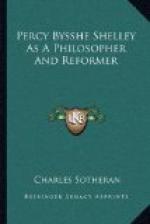He conceived from the re-arrangement of the marriage relation by greater facility of divorce than was to be had sixty years ago,[F]
“A fit and natural arrangement would result.”
[Footnote F: It should be remembered that in Shelley’s day divorce was obtainable by the most wealthy only, at an enormous cost and by a lengthy process, precluding the slightest opportunity for the middle and poorer classes to avail themselves thereof.]
Shelley by no means asserts that the intercourse would be promiscuous, but on the contrary believed that from the relation of parent to child a union is generally of longer duration, placed on such a footing, and marked above all others with generosity and self-devotion.
We are on the eve of great religious changes, which must consequently disturb all the social relations. Historical Christianity still holds to her old text, of marriage being a sacrament, and therefore indissoluble. The founder of Comtism developing this dogma, urges that after the death of either husband or wife the duty of the survivor is not to re-marry. Great Britain and many of the American States have conceded greater freedom in divorce, so as to carry out in a large measure the arguments of Shelley, while the theory of what is termed the “sovereignty of the individual” is propounded by the leaders of the free love party, as a cure for the present and former difficulties.
Whatever may be the outcome of the present widespread discussions I know not, but I have belief in the supreme intelligence and in humanity, and am certain that neither the home nor the race will suffer, but that out of all this agitation will come more refined sentiment and truer morality.
I must now conclude. It has been said that there are two things in which the professors of all theologies have agreed-"To persecute all other sects, and plunder their own.” Shelley, who subscribed to no theology, was persecuted by them during his entire life, but he ever forgave his persecutors, who he was confident acted through ignorance of his real motives, and he tells us:
“I have thought to appeal to something in common and unburden my inmost soul to them. I have found my language misunderstood, like one in a distant and savage land. The more opportunities they have afforded me for experience, the wider has appeared the interval between us, and to a greater distance have the points of sympathy been withdrawn. With a spirit ill-fitted to sustain such proof, trembling and feeble through its tenderness, I have everywhere sought sympathy, and have found only repulse and disappointment.”
Do we misunderstand him? I think not,




